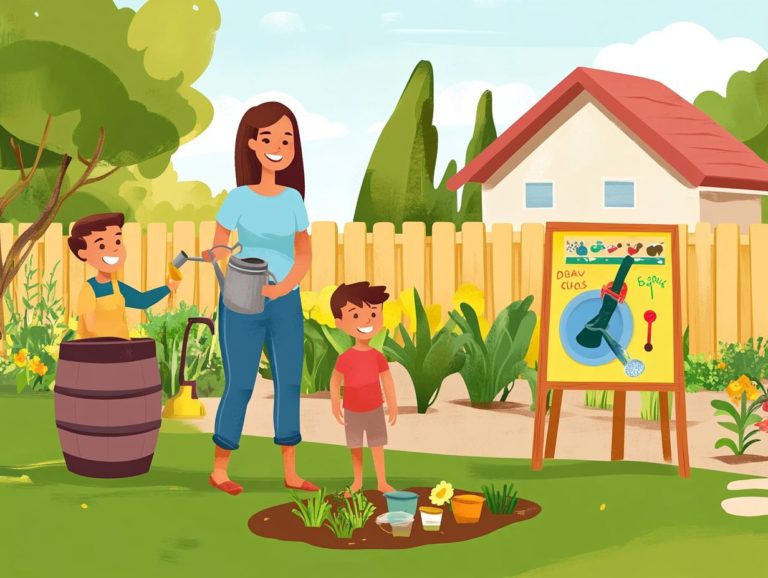Water Conservation Laws: What You Should Know
Water conservation is increasingly essential due to our changing climate. Understanding water conservation laws is crucial for individuals and businesses looking to make a positive impact.
This article defines and explains the purpose of these laws. It examines the different types currently in effect and highlights their environmental and economic impacts. It also covers how these laws are enforced while offering practical tips for compliance.
Dive in to discover how you can make a real difference today!
Contents
- Key Takeaways:
- Understanding Water Conservation Laws
- Types of Water Conservation Laws
- Impact of Water Conservation Laws
- Enforcement of Water Conservation Laws
- How to Comply with Water Conservation Laws
- Frequently Asked Questions
- What is the purpose of water conservation laws?
- What are the main components of water conservation laws?
- How do water conservation laws impact individuals and businesses?
- What are some common water conservation measures required by laws?
- What are the penalties for violating water conservation laws?
- What can individuals do to help conserve water?
Key Takeaways:
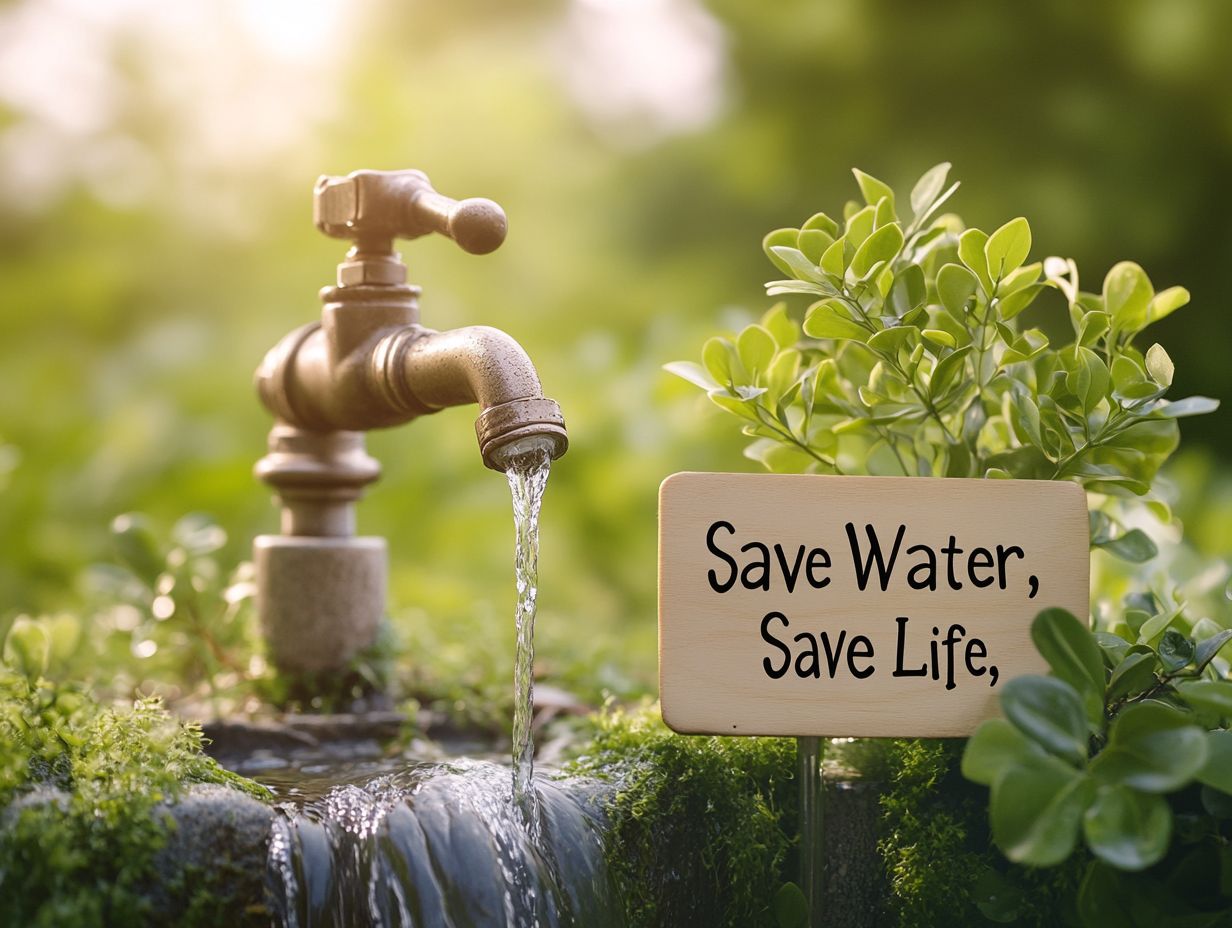
- Water conservation laws aim to preserve and protect our limited water resources for present and future generations.
- These laws can be regulatory, imposing restrictions and penalties, or incentive-based, providing rewards for conservation efforts.
- Compliance with water conservation laws benefits the environment and helps save money while contributing to a sustainable future.
Understanding Water Conservation Laws
Understanding water conservation laws is essential for the sustainable management and responsible use of our precious water resources. These laws cover a range of conservation policies and regulations aimed at mitigating the impacts of drought.
In California, the importance of these laws is emphasized by the California Department of Water Resources. It has established strict guidelines and community partnerships to enhance water efficiency.
By following best management practices, you can contribute to effective urban water conservation strategies. This ultimately leads to improved environmental management.
Definition and Purpose
The definition and purpose of water conservation encompass a wide range of initiatives aimed at sustaining water resources for future generations. This includes addressing both environmental management and community needs.
Water conservation seeks to reduce waste and promote efficient use while ensuring the availability of drinking water amid growing demand and challenging drought conditions.
This crucial practice urgently helps mitigate the impacts of climate change. It also plays a significant role in preserving ecosystems and relieving the strain on local water supplies.
By implementing effective conservation policies, you and your community can adopt strategies that promote sustainable consumption and protect essential habitats. Such policies encourage responsible usage, fostering a culture of environmental stewardship.
Integrating water conservation into local planning efforts is vital for meeting the needs of both present and future populations while safeguarding precious resources.
Types of Water Conservation Laws
There are two main types of water conservation laws: regulatory laws and incentive-based laws. Each takes a unique approach to managing water resources and fostering conservation efforts.
Regulatory laws typically manifest as stringent plumbing regulations or water usage restrictions. These ensure that residents and businesses adhere to necessary guidelines, particularly in drought-prone areas.
In contrast, incentive-based laws motivate voluntary compliance by offering benefits for those who adopt water-saving systems or practices.
Understanding the details of these types of laws is crucial for crafting an effective water conservation strategy.
Regulatory and Incentive-based Laws
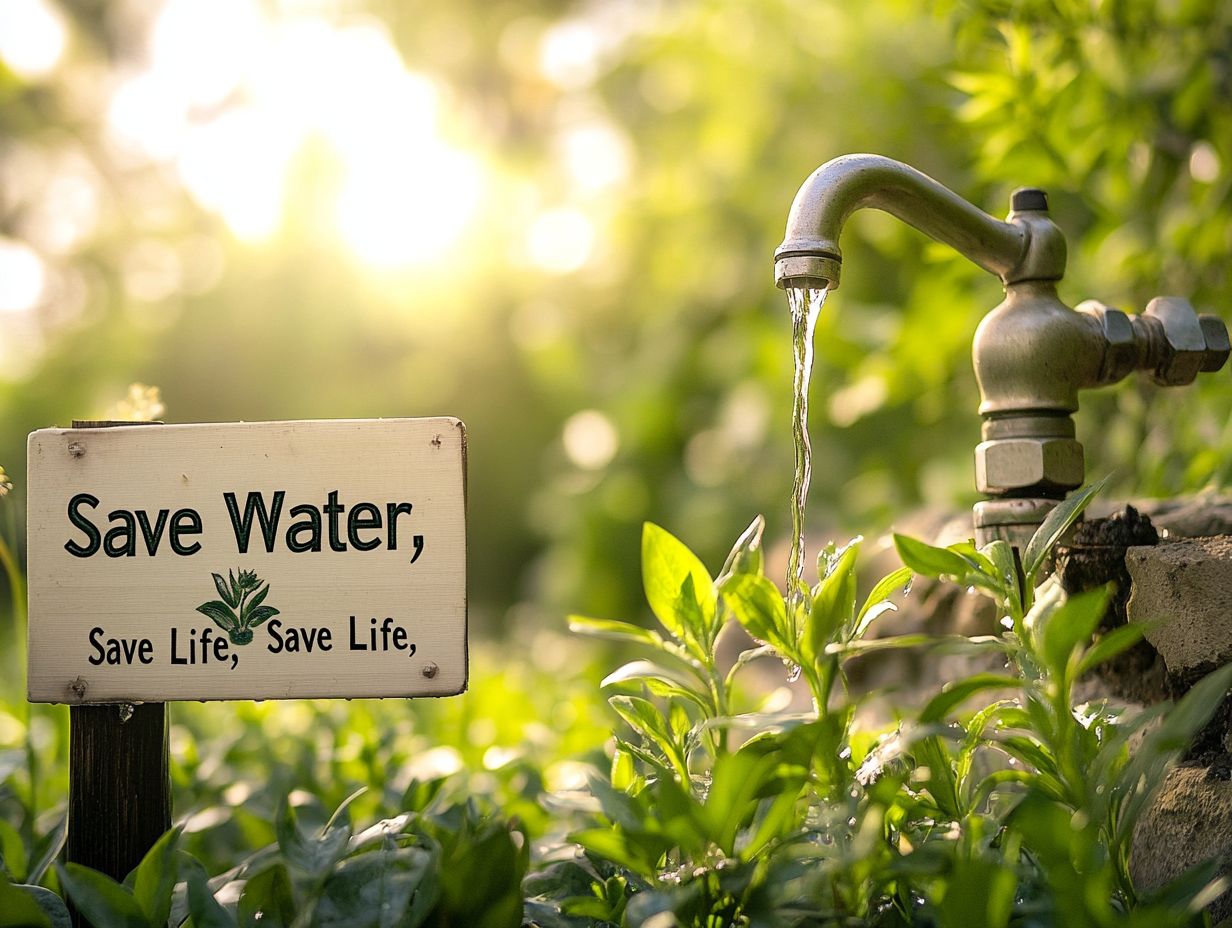
Regulatory laws impose strict guidelines on water usage. Meanwhile, incentive-based laws provide rewards for conservation efforts, creating a balanced approach to water management.
This dual framework is essential for navigating the complex landscape of water resources, especially in regions grappling with chronic droughts.
For example, the California Department of Water Resources has established regulations that set maximum allowable water usage for agriculture. This ensures that everyone commits to vital conservation practices.
On the other hand, incentive programs like rebates for replacing grass lawns with drought-resistant landscaping encourage residents to embrace water-saving habits.
A compelling case study from Los Angeles illustrates how these combined efforts significantly reduced water consumption. This highlights the effectiveness of both strategies in achieving sustainable water management.
Impact of Water Conservation Laws
The implications of water conservation laws reach far beyond simple compliance; they play a crucial role in shaping both environmental and economic landscapes that are essential for the vitality of your community.
By enhancing water efficiency, you can help alleviate the challenges posed by drought. This ensures that drinking water supplies remain steady even in times of scarcity.
These laws foster collaboration among residents, businesses, and local governments. This collaboration cultivates a conservation-minded culture that benefits both the environment and the economy.
Understanding these impacts is vital for recognizing the broader significance of your efforts in water conservation.
Environmental and Economic Effects
Water conservation laws offer environmental and economic advantages. They encourage water efficiency, bolster sustainable economic growth, and support effective environmental management.
By reducing overall water consumption, these regulations enhance water quality. Less runoff and wastewater lead to healthier aquatic ecosystems.
Regions that implement stringent conservation measures often see a marked decline in ecosystem degradation. This not only fosters biodiversity but also strengthens natural habitats.
Additionally, these laws frequently lead to job creation in the green technology sector. Innovation flourishes in response to the demand for more efficient irrigation systems and water recycling facilities.
For example, a case study in California highlighted the economic uplift and job opportunities that emerged in communities embracing water conservation practices. It illustrates how environmental stewardship and financial benefits can go hand in hand.
Enforcement of Water Conservation Laws
The enforcement of water conservation laws is crucial for ensuring compliance and effectiveness. This is primarily overseen by agencies like the California Department of Water Resources.
These agencies implement water use restrictions and monitor adherence to established conservation policies. When non-compliance occurs, penalties are imposed to promote responsible water use and discourage wastefulness, especially during emergency drought regulations.
By understanding the enforcement mechanisms in place, you can better appreciate the significance of these laws and their impact on your community.
Agencias y Sanciones
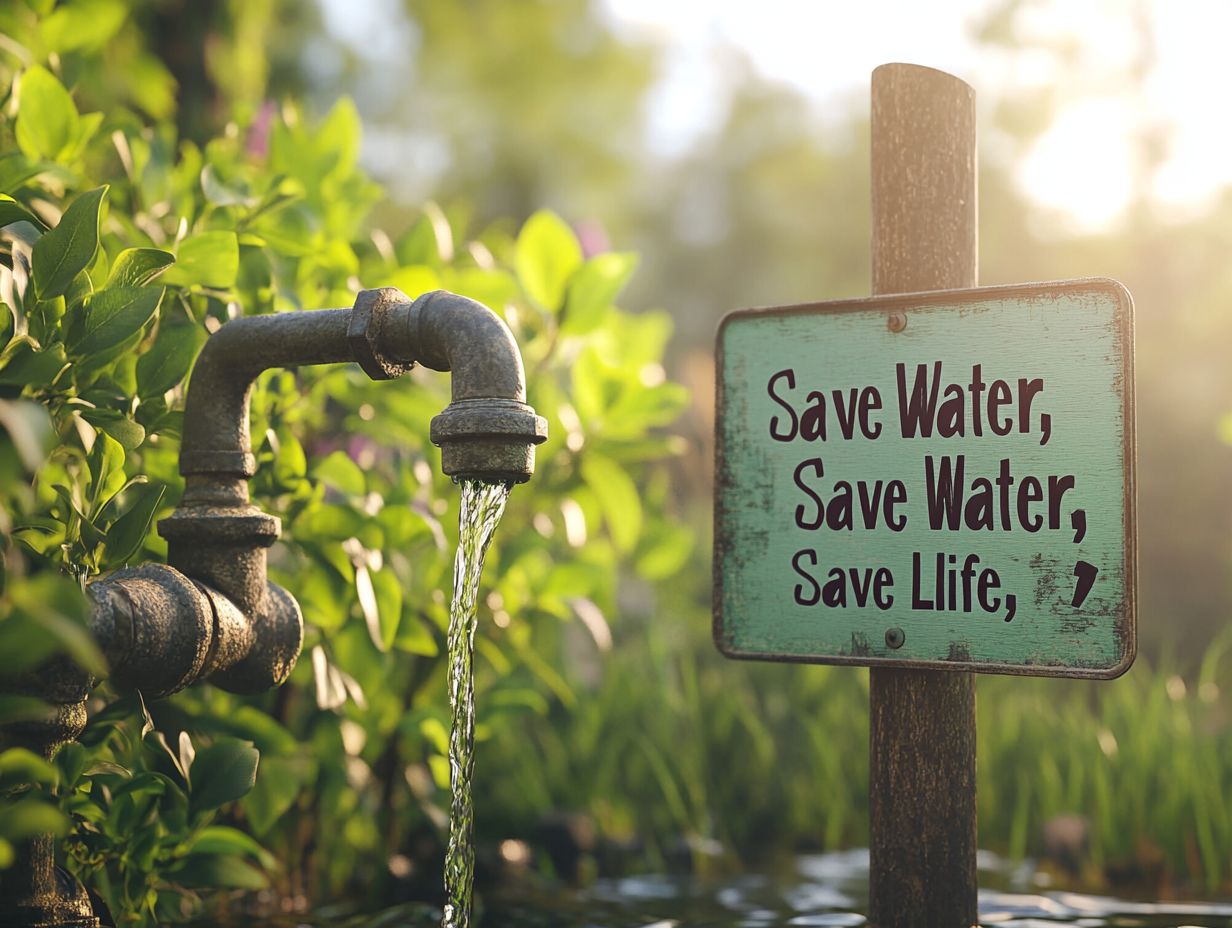
Enforcement agencies, like the California Department of Water Resources, play a crucial role in ensuring compliance with water conservation laws. They impose penalties for violations to encourage responsible usage.
Operating within a structured framework, these agencies engage in monitoring, investigations, and enforcement actions to ensure all stakeholders adhere to legal standards.
Through regular inspections and meticulous data analysis, they evaluate compliance and can issue warnings or penalties based on established guidelines.
In 2015, the California Department of Water Resources identified numerous offenders of water waste and imposed substantial fines. This effectively compelled both businesses and residents to change their water usage behaviors.
Such actions not only deter future violations but also foster a culture of sustainability. This illustrates how effective enforcement can lead to positive environmental outcomes.
How to Comply with Water Conservation Laws
Complying with water conservation laws is crucial for everyone, from homeowners to businesses. You can easily achieve this through practical tips for conserving water both indoors and outdoors.
By following landscaping guidelines that favor drought-resistant plants and embracing plumbing systems that use less water without reducing performance, you can realize significant reductions in water usage.
Moreover, optimizing your indoor water use by adopting water-saving systems can further enhance your conservation efforts.
These practices ensure you meet regulatory requirements while contributing to a more sustainable future for your community.
Join the movement! Adopt these water-saving practices today and participate in local conservation efforts to make a difference.
Tips for Conserving Water at Home and in Businesses
Conserving water at home and in businesses is essential. Implement practical strategies to significantly reduce both indoor and outdoor water use.
Start by fixing leaks promptly. Even minor drips can lead to major water waste over time.
Install water-saving toilets and faucets to drastically cut your indoor consumption. For outdoor areas, consider drought-resistant landscaping to save water and enhance beauty.
Imagine a garden filled with native plants that thrive with minimal watering. Commercial spaces could also benefit from rainwater collection systems.
These thoughtful approaches create a sustainable environment, making your commitment to conservation impactful and rewarding.
Frequently Asked Questions
What is the purpose of water conservation laws?
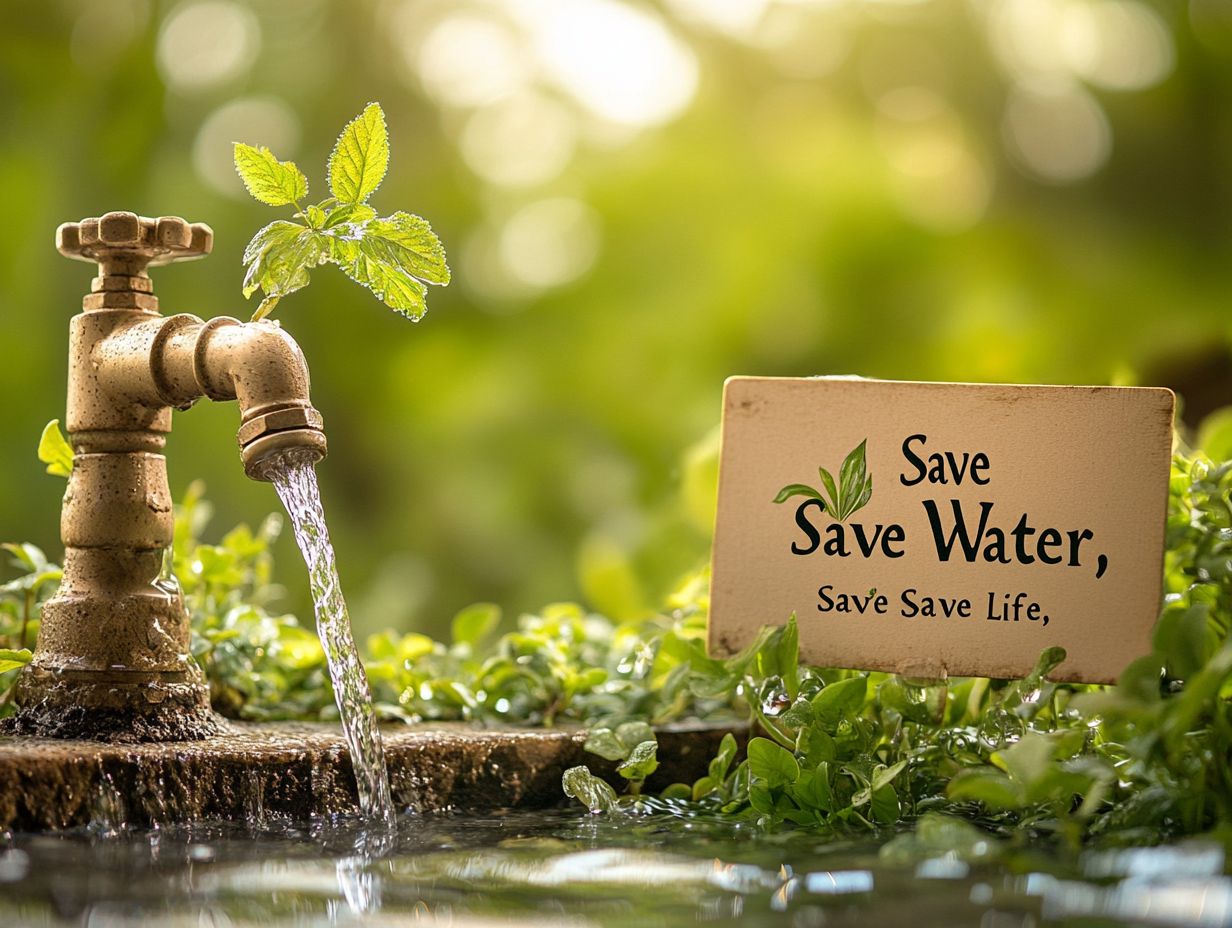
Water conservation laws regulate and manage water use to ensure responsible and sustainable use of this vital resource.
What are the main components of water conservation laws?
These laws include regulations on water use, restrictions on withdrawals, guidelines for efficiency, and penalties for violations.
How do water conservation laws impact individuals and businesses?
These laws can limit water usage for individuals and businesses. They may require water-saving measures and impose fines for excessive use.
What are some common water conservation measures required by laws?
Common measures include using low-flow fixtures and restrictions on outdoor watering during certain times.
What are the penalties for violating water conservation laws?
Violations may result in fines or restricted water usage. Repeated violations could lead to more severe consequences, like legal action.
What can individuals do to help conserve water?
Be mindful of your water usage. Fix leaks, use water-efficient appliances, and follow local conservation guidelines to make a difference.
Stay informed about updates to water conservation laws to contribute to the cause!




